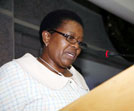23 October 2009: The Technical Session of the African Ministerial Conference on the Environment (AMCEN) Pre-COP 15 (Second Meeting of the African High Level Expert Panel on Climate Change) convened from 19-23 October 2009, in Addis Ababa, Ethiopia, and concluded with a call for a “fair, inclusive, effective and equitable new agreement in Copenhagen.” The […]
 23 October 2009: The Technical Session of the African Ministerial Conference on the Environment (AMCEN) Pre-COP 15 (Second Meeting of the African High Level Expert Panel on Climate Change) convened from 19-23 October 2009, in Addis Ababa, Ethiopia, and concluded with a call for a “fair, inclusive, effective and equitable new agreement in Copenhagen.” The session was the initiative of AMCEN and the African Union (AU), in collaboration with the UN Economic Commission for Africa (ECA) and the UN Environment Programme (UNEP).
23 October 2009: The Technical Session of the African Ministerial Conference on the Environment (AMCEN) Pre-COP 15 (Second Meeting of the African High Level Expert Panel on Climate Change) convened from 19-23 October 2009, in Addis Ababa, Ethiopia, and concluded with a call for a “fair, inclusive, effective and equitable new agreement in Copenhagen.” The session was the initiative of AMCEN and the African Union (AU), in collaboration with the UN Economic Commission for Africa (ECA) and the UN Environment Programme (UNEP).
The Technical Session was the last major preparatory meeting in Africa before COP 15 in Copenhagen in December, and aimed to consolidate the region’s common position ahead of the meeting. At the meeting, participants discussed: Africa’s common negotiating position; the framework of African climate change programmes and associated frameworks of sub-regional climate change programmes; and issues being negotiated in connection with the post-2012 international climate change regime.
The meeting also produced several key messages for the international community in respect to Africa’s position, including that: Africa should be equitably compensated, in the context of environmental justice, for environmental, economic and social losses, in light of developed countries’ historical responsibility for climate change; the region requires new, sustained and scaled-up finance, technology and capacity for adaptation and risk management; institutional arrangements must be equitable and transparent; the region’s adaptation measures should be based on the precautionary principle; and mitigation actions for Africa should be voluntary and nationally appropriate, and supported by technology transfer, finance and capacity building from developed countries. In addition, it was agreed that, for Africa, successful negotiations at COP 15 must produce a two-track outcome, one track agreeing further commitments for developed countries under the Kyoto Protocol, and the other track resulting in a separate legal instrument, which should be the outcome of the Bali Action Plan negotiations. In this respect, negotiators highlighted that Africa would neither accept replacement of the Kyoto Protocol nor its merger with any new agreement. The meeting also agreed that Africa’s shared vision calls for “a fair, inclusive, effective and equitable new agreement in Copenhagen that will benefit the climate and vulnerable countries and be undertaken in the context of poverty eradication, sustainable development and the need for gender equity.” The updated and consolidated African Common Position will be submitted to African Ministers and Heads of State on the eve of the COP- 15 in Copenhagen. [ECA press release] [UNEP press release] [Meeting webpage]